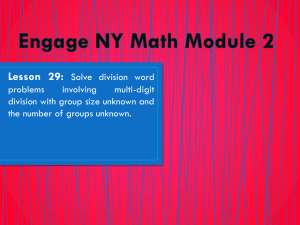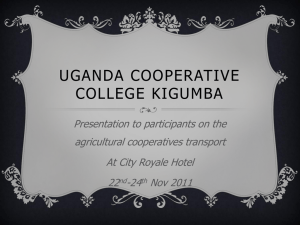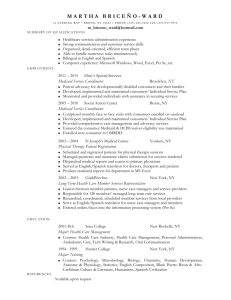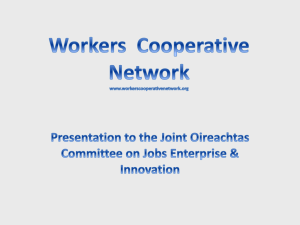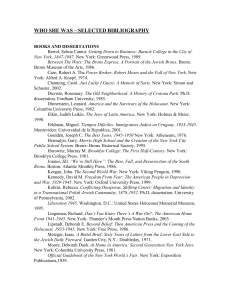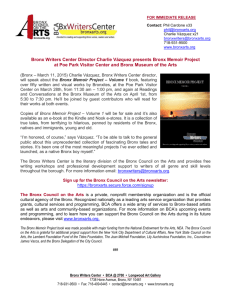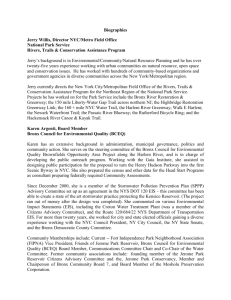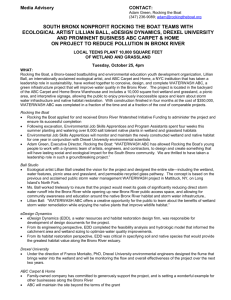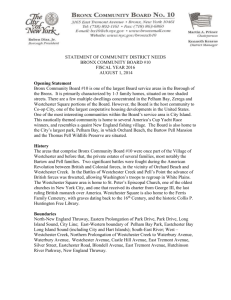511-SP15-Defilippis-20150126-150636
advertisement
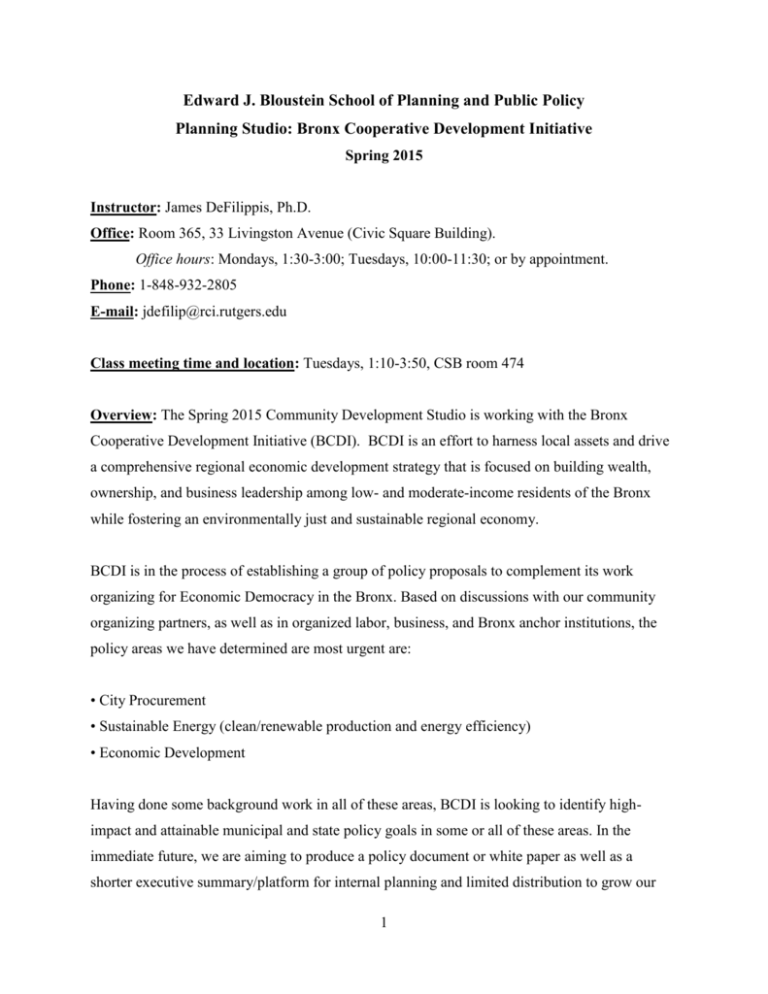
Edward J. Bloustein School of Planning and Public Policy Planning Studio: Bronx Cooperative Development Initiative Spring 2015 Instructor: James DeFilippis, Ph.D. Office: Room 365, 33 Livingston Avenue (Civic Square Building). Office hours: Mondays, 1:30-3:00; Tuesdays, 10:00-11:30; or by appointment. Phone: 1-848-932-2805 E-mail: jdefilip@rci.rutgers.edu Class meeting time and location: Tuesdays, 1:10-3:50, CSB room 474 Overview: The Spring 2015 Community Development Studio is working with the Bronx Cooperative Development Initiative (BCDI). BCDI is an effort to harness local assets and drive a comprehensive regional economic development strategy that is focused on building wealth, ownership, and business leadership among low- and moderate-income residents of the Bronx while fostering an environmentally just and sustainable regional economy. BCDI is in the process of establishing a group of policy proposals to complement its work organizing for Economic Democracy in the Bronx. Based on discussions with our community organizing partners, as well as in organized labor, business, and Bronx anchor institutions, the policy areas we have determined are most urgent are: • City Procurement • Sustainable Energy (clean/renewable production and energy efficiency) • Economic Development Having done some background work in all of these areas, BCDI is looking to identify highimpact and attainable municipal and state policy goals in some or all of these areas. In the immediate future, we are aiming to produce a policy document or white paper as well as a shorter executive summary/platform for internal planning and limited distribution to grow our 1 network of partners. The studio will do all three policy areas or potentially only two, depending on how many students there are enrolled in the course. Scope of Work: The studio students will work with BCDI and its partners to identify goals and will conduct research on the policy ways in which those goals can be translated into specific policies. Thus the studio will be a combination of facilitating the agenda setting by BCDI and its partners, and outside research on how such an agenda could be realized in policy, and the appropriate scale (state or municipal) at which such policies should be, or need to be enacted. At the end of the semester, the studio should have three policy white papers for BCDI. These need not be a complete set of policy recommendations, but, rather, a set of potential avenues that BCDI might pursue. This “menu” of possible policies should include information on the tradeoffs that inhere in them, and guidance on what values and decisions should inform which of the choices BCDI decides to pursue. Structure of the Course: Grading: Your grade in the course will be based on the following: Participation and Group/Class Citizenship: 25% Presentation: 25% Report: 50% Outputs of the Studio: There will be two primary outputs to the studio: 1. A presentation at the end of the semester to BCDI and its partner organizations 2. The policy white paper drafts, which will be focused on the three issues noted above 2 Teams in the Studio: The studio will be divided into three teams, to handle the three different white papers. Each team will select a leader who will be responsible for coordinating communication between the team and the rest of the course. Sakai: The course website includes initial readings and background materials. We will use Sakai as our main center for communication. We will post research materials to share, draft documents and team reviews, and communicate through discussion boards. It is important, therefore that the teams keep their materials updated and post new material promptly when they are ready. Course Calendar January 20: Introduction to the Bronx Cooperative Development Initiative. Representatives from BCDI to attend class in New Brunswick. Readings: BCDI. 2014. BCDI Concept Paper. (NOTE: This is confidential, and not to be shared with anyone) BCDI. 2014. Community Enterprise Network: Core Infrastructure Iuviene, Nick. 2010. Building a Platform for Economic Democracy. Master’s Thesis. Cambridge, MA: Department of Urban Studies and Planning, MIT MIT CoLab. 2011. Development Study for the Bronx Cooperative Development Initiative. Cambridge, MA: Department of Urban Studies and Planning, MIT January 27: Background on co-ops and community development Readings: 3 Casper-Futterman, Evan. 2011. Back to (Non)Basics: Worker Cooperatives as Economic Development. Berkeley Planning Journal. 24: 115-130 Majee, Wilson and Ann Hoyt. 2011. Cooperatives and Community Development: A Perspective on the Use of Cooperatives in Development. Journal of Community Practice, 19:48–61 Shelterforce. Fall/Winter 2013/14. The “Work” Issue. Zeuli, Kimberly and Jamie Radel. 2005. Cooperatives as a Community Development Strategy: Linking Theory and Practice. Journal of Regional Analysis and Policy. 35(1): 43-54 February 3rd: Field trip to the Bronx to meet with BCDI and its partner organizations Readings: Lehman College. 2014. Discovering the Bonx. Using Census Data to Highlight Social Problems and Achievements in a Major Urban Area url: http://www.lehman.edu/deannss/bronxdatactr/discover/bxtext.htm#S2013 Groarke, Margaret and Jordan Moss. 2002. “Keepin’ it Real: Community Organizing in the Bronx”, in Ben Shepard and Ron Hayduk, eds. From ACT UP to the WTO: Urban Protest and Community Building in the Era of Globalization. New York: Verso Books. Three background documents on the three policy areas we will be working on. February 10: Project work February 17: Project work February 24: Project work March 3: Project work 4 March 10: Mid-semester meeting with the client. March 17: Project work March 24: Project work March 31: Project work April 7: Draft white papers done. April 14: Draft presentations done. April 21: Draft presentation at Bloustein April 28: Final presentation to the BCDI and its partner organizations 5 Web resources: Industrial Cooperatives Association url: http://ica-group.org/ Ohio Employee Ownership Center url: http://www.oeockent.org/ Evergreen Cooperatives url: http://evergreencooperatives.com/ University of Wisconsin Center for Cooperatives url: http://www.uwcc.wisc.edu/ National Cooperative Business Association url: http://www.ncba.coop/ Further readings: Co-Ops, Community Ownership and Control Adams, Frank and David Ellerman. 1989. Your Own Boss: Democratic Worker Ownership. Social Policy. Winter: 12-18 Cline, John. n.d. The Worker Cooperative: A Vehicle for Economic Development. DeFilippis, James. 2004. Unmaking Goliath: Community Control in the Face of Global Capital. New York: Routledge Democracy Collaborative. 2014. Policies for Community Wealth Building: Leveraging State and Local Resources. 6 Gunn, Christopher and Hazel Gunn. 1991. Reclaiming Capital: Democratic Initiatives and Community Development. Ithaca, NY: Cornell University Press Imbroscio, David. 1997. Reconstructing City Politics: Alternative Economic Development and Urban Regimes. Thousand Oaks, CA: Sage Publications Megson, James and Michael O’Toole. 1993. Employee Ownership: The Vehicle for Community Development and Local Economic Control. Boston: Industrial Cooperatives Association Olson, Deborah Groban. 1986-87. Employee Ownership: An Economic Development Tool for Anchoring Capital in Local Communities. New York University Review of Law and Social Change. 15: 239-267 Russell, Raymond. 1984. Using Ownership to Control: Making Workers Owners in the Contemporary United States. Politics and Society. 13: 253-294 Wilkenson, Paul and Jack Quarter. 1996. Building a Community-Controlled Economy: The Evangeline Co-operative Experience. Toronto: University of Toronto Press Williamson, Thad, David Imbroscio, and Gar Alperovitz. 2003. Making a Place for Community: Local Democracy in a Global Era. New York: Routledge Wills, Jane. 1998. A Stake in Place? The geography of employee ownership and its implications for a stakeholding society. Transactions of the Institute of British Geographers. 23: 79-94 The Bronx Gonzalez, Evelyn. 2006. The Bronx. New York: Columbia University Press Hill, Emita Brady, et al. 2014. Bronx Faces and Voices: Sixteen Stories of Courage and Community. Texas Tech University Press 7 Rooney, Jim. 1994. Organizing the South Bronx. Albany: State University of New York Press Anchor Institutions, Import-Substitution, and Local Economic Development Martin, Deborah. 2004. Reconstructing Urban Politics: Neighborhood Activism in Land-Use Change. Urban Affairs Review. 39(5): 589-612 Persky, Joseph, David Ranney, and Wim Wiewel. 1993. Import Substitution and Local Economic Development. Economic Development Quarterly. 7(1): 18-29 Serang, Farzana, J. Phillip Thompson, Ted Howard. 2010. The Anchor Mission: Leveraging the Power of Anchor Institutions to Build Community Wealth. Cambridge, MA: Department of Urban Studies and Planning, MIT Robert Mark Silverman, Robert Mark, Jade Lewis, and Kelly L. Patterson. 2014. William Worthy’s Concept of ‘‘Institutional Rape’’ Revisited: Anchor Institutions and Residential Displacement in Buffalo, NY. Humanity & Society. 1-24 Yates, Jacquelyn. n.d. Can “Anchor Institutions” Help Revitalize Declining Neighborhoods by Buying from Local Cooperatives?: The Evergreen Cooperative Initiative. Ohio Employee Ownership Center 8


